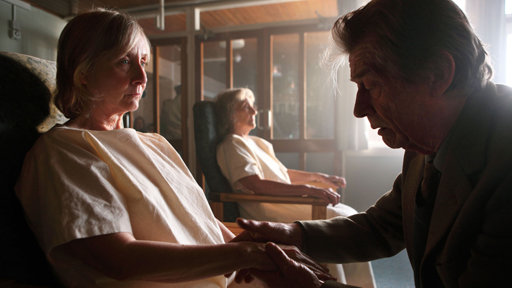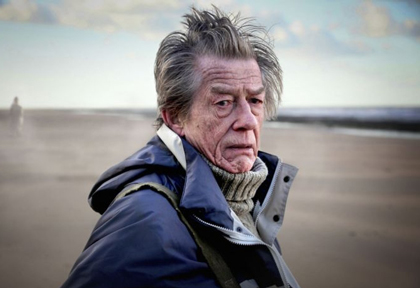December 27, 2010
Old Haunts

Well, the new version of Whistle and I'll Come to You was a surprisingly welcome antidote to all the - literal and figurative - noise of Christmas television. Noise in entertainment culture functions in precisely the opposite sense to Noise the non (musical) genre: it's not an invitation to explore the materialities of sound beyond music, but a question of submitting to sound being used ballistically, as a behaviouristic bludgeon triggering familiar associations.
One of the enjoyable things about the reinvention was its (verbal) silence. The dialogue can't have amounted to more than a few pages of script. The verbal silence allowed for a close attention to both diegetic and non-diegetic sound. The atmosphere was set by subtle murmuring electronics, while, initially, the night terrors to which John Hurt's Parkin was subject were predominantly sonic. Parkin was beset by acousmatic entities, rattles and scrapings detached from any identifiable origin. It's no accident that when the horror took on a visible form, it was immediately less powerful.
What dialogue there was - whether it consisted of apparent banalities ("You should have known her when she was herself", "We have a double room for you", "I wish you were here") or Parkin's disquisition on the universe's indifference (it conserves energy, but wastes love) - was heavily freighted with uncanny philosophical implications.
In Jonathan Miller's 1968 version, the focus was on Parkins's own incipient dementia. In the new version, Parkin is tormented by the dementia that has reduced his wife to a catatonic shell. The story was relocated from Suffolk to the West country coast and with the folorn Parkin revisiting, as he himself put it, he and his wife's "old haunts" in Devon, one couldn't help but recall Hardy's love poetry. Practically any line from Hardy's "After a Journey" could have served as an epigraph for this version of Oh Whistle: "Hereto I come to view a voiceless ghost ... Up the cliff, down, till I'm lonely, lost ... Yes: I have re-entered your olden haunts at last ... I see what you are doing: you are leading me on/ To the spots we knew when we haunted here together." James was the kind of Christian Oxford academic towards whom Hardy felt resentment, but in some ways both James the antiquarian turned ghost story writer and Hardy the upstart man of letters were equally strangers in the twentieth century.
The demonic entities in James's stories were typically characterised as unquiet atavisms: relics from a pre-Christian past. In this new version, Parkin instead confronted a horror proper to the era of speculative realism, becoming fixated on objects whose interiors remain opaque, their blank, inexpressive surfaces masking what could be malign designs. The vast geological features through which Parkin walked on the beach connoted a deep time indifferent to human existence; while the psychic death of his wife ("a body that has outlasted the existence of the personality: more horrifying than any spook or ghoul") was made to presage cosmic extinction itself. "There is nothing inside us," Parkin mordantly declared. "There are no ghosts in these machines. Man is matter, and matter rots." Yet Parkin's own statement establishes that there are ghosts in the machine, that a certain kind of spectrality is intrinsic to the speaking subject. After all, who is it who can talk of having no inside, of man being rotting matter? Not any substantial subject perhaps, but the subject who speaks, the subject, that is to say, composed out of the undead, discorporate stuff of language. In the very act of announcing in its own nullity, the subject does not so much engage in performative contradiction (as, for instance, certain critics of Thomas Metzinger would have it: "how can Metzinger refer to himself as I" etc), but points to a ineradicable dualism that results from subjectivity itself. This dualism is not a substance dualism - rather it is a phenomenological dualism that follows directly from the acknowledgement that there is only one substance. The condition of materialists such as Parkin (our condition in other words) is of knowing that all subjectivity is reducible to matter, that no subjectivity can survive the death of the body, but of nevertheless being unable to experience onself as mere matter. Here we come to the paradoxical materialist point that comes out of fictions such as Neuromancer and Inception, which is not that experience is always embodied, but the opposite: that all experience is out of body experience. Once the body is recognised as the substrate-precondition of experience, then one is immediately compelled to accept this phenomenological dualism, precisely because experience and its substrate can be separated. There are ghosts in the machine, and we are they.
